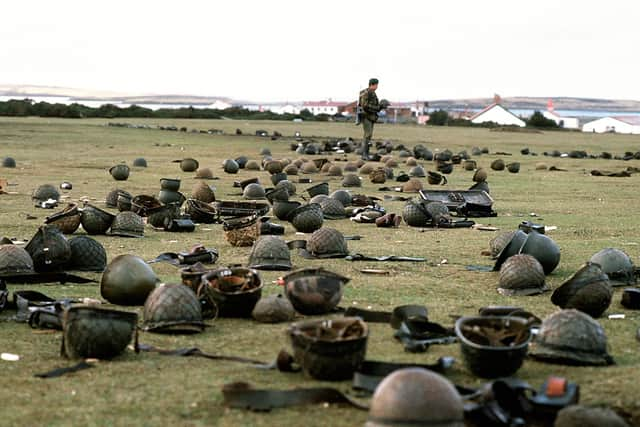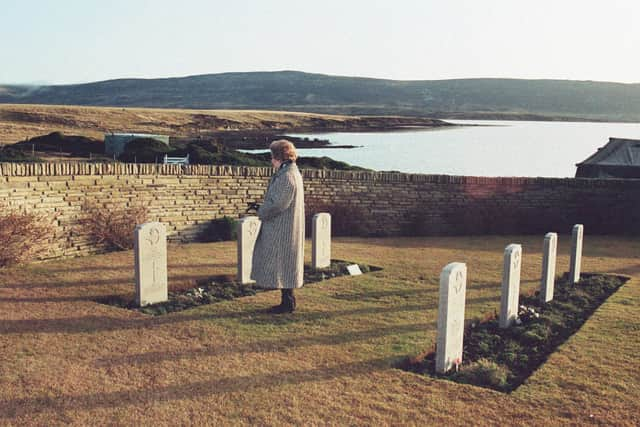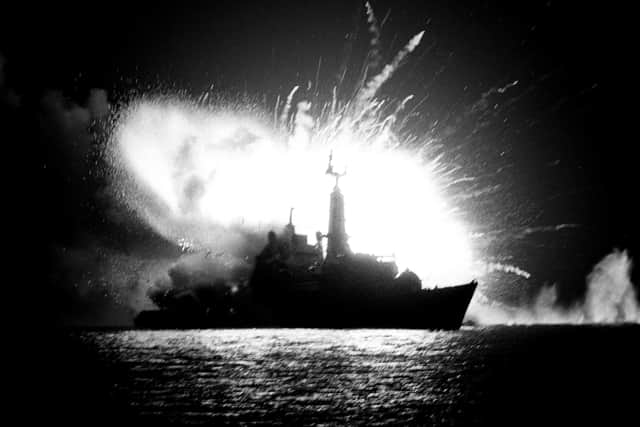How Falklands war unfolded in Downing Street 40 years ago and the key warnings that were ignored – Bernard Ingham
No wonder we never seem to learn anything from history.
Forty years earlier we were not exactly prepared for the Second World War.


Advertisement
Hide AdAdvertisement
Hide AdAnd now 40 years on the West stands accused of doing little or nothing to deter Vladimir Putin from invading the Ukraine.
The big question immediately after the Argentine invasion of the Falklands on April 2, 1982, was whether Britain had brought it on itself.
First, we had hawked around South America the idea of “leaseback” – conceding Argentine sovereignty but leasing it back to the Falklanders – until the idea was shot down in the Commons.
Then we intended to withdraw the Antarctic survey ship, Endurance, as an economy measure. The vessel had all the military threat of a peashooter but it was a token of our commitment to the Falklands area.


Advertisement
Hide AdAdvertisement
Hide AdAnd finally a Latin-American Steptoe and Son, as they were described, landed on South Georgia and hoisted the Argentinian flag before starting to dismantle the old whaling station.
You cannot do much immediately to shift interlopers from a dependency 800 miles east of the Falklands on the edge of Antarctica.
But did we react strongly enough?
All this flew at me, as Margaret Thatcher’s press secretary, at the start of the most testing, wearing and traumatic three months of my entire career.


Never in my 24 years of Government service have I felt such a sense of Ministerial shellshock as on the day after the Argentine invasion – a Saturday.
Advertisement
Hide AdAdvertisement
Hide AdThe tenseness of the atmosphere in the PM’s room at the House was electric, even though Labour was as outraged as Ministers at this invasion of the Queen’s territory.
Then Foreign Secretary, Lord Carrington, gave me the thumbs down signal on his return to Cabinet after addressing Tory MPs.
He and his Ministerial team resigned over the failure of intelligence from Buenos Aires. And as if that were not enough Defence Secretary, John Nott, also wanted to resign – until Mrs Thatcher told him to do his duty.
All this against the background of high inflation and interest rates and soaring unemployment as Mrs Thatcher battled to rescue the economy from 20 years’ abuse of union power.
Advertisement
Hide AdAdvertisement
Hide AdIt has long been argued that no male PM would ever have sent a task force steaming 8,000 miles south on such a risky venture to recover the islands.
But for Mrs Thatcher it was a matter of honour and principle.
“No small country will be safe if dictators can march in and take over”, she told a torn President Reagan.
The day was saved among much pessimism when the First Sea Lord, Admiral Henry Leach, said he could assemble a task force over the weekend.
Advertisement
Hide AdAdvertisement
Hide AdHe was told to get on with it, pending a final decision to sail.
And sail it did – to much national fervour.
The least of my early problems was maintaining public support.
But behind the scenes I was fighting two internecine wars – with a secretive machine that left me dangerously exposed and more specifically with the Ministry of Defence.
The Royal Navy understandably did not want a single journalist aboard the task force.
Advertisement
Hide AdAdvertisement
Hide AdI felt that we simply could not go to war without reporters, still less set the media against the Government from the outset.
Eventually, I managed to get 29 reporters, cameramen and technicians accredited.
Then the MoD’s Permanent Secretary, Sir Frank Cooper, rang to say he did not want me briefing the media.
I said he had a problem: there was not a spare inch of carpet left in my room when I met the press.
In any case, the PM was running the show.
Advertisement
Hide AdAdvertisement
Hide AdI had for months been trying to get the MoD to appoint a professional head of PR.
All I got was the deputy, Ian McDonald, cruelly deputed to give Dalek-type statements for the cameras.
When the MoD did get round to appointing a head of PR, the respected Neville Taylor arrived only to find he was in charge of everything presentational but the Falklands campaign.
And so it went on.
My trials were not, of course, lethal in a campaign that cost 255 lives.
Advertisement
Hide AdAdvertisement
Hide AdBut I can think of few worse ways to embark on a perilous adventure.
In spite of it, we won, but 40 years on the Argentine doesn’t give up its claim to the Falklands. Beware.
Support The Yorkshire Post and become a subscriber today. Your subscription will help us to continue to bring quality news to the people of Yorkshire. In return, you’ll see fewer ads on site, get free access to our app, receive exclusive members-only offers and access to all premium content and columns. Click here to subscribe.
Comment Guidelines
National World encourages reader discussion on our stories. User feedback, insights and back-and-forth exchanges add a rich layer of context to reporting. Please review our Community Guidelines before commenting.